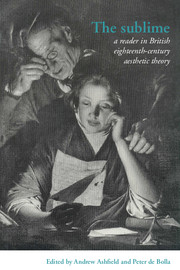Book contents
- Frontmatter
- Contents
- List of Abbreviations
- Introduction
- Part I The Longinian tradition
- 1 Dionysius Longinus on the sublime (1743)
- 2 Remarks on a book entitled, Prince Arthur (1696)
- 3 The advancement and reformation of modern poetry (1701)
- 4 The grounds of criticism in poetry (1704)
- 5 Essays upon several subjects (1716)
- 6 A miscellany of ingenious thoughts (1721)
- 7 An essay on the theory of painting (1725)
- 8 Reflections on the nature and property of languages (London 1731)
- 9 The works (1735)
- 10 Lectures on poetry (1742)
- Part II Rhapsody to rhetoric
- Part III Irish Perspectives
- Part IV The Aberdonian Enlightenment
- Part V Edinburgh and Glasgow
- Part VI From the Picturesque to the Political
- Sources and further reading
2 - Remarks on a book entitled, Prince Arthur (1696)
Published online by Cambridge University Press: 05 June 2012
- Frontmatter
- Contents
- List of Abbreviations
- Introduction
- Part I The Longinian tradition
- 1 Dionysius Longinus on the sublime (1743)
- 2 Remarks on a book entitled, Prince Arthur (1696)
- 3 The advancement and reformation of modern poetry (1701)
- 4 The grounds of criticism in poetry (1704)
- 5 Essays upon several subjects (1716)
- 6 A miscellany of ingenious thoughts (1721)
- 7 An essay on the theory of painting (1725)
- 8 Reflections on the nature and property of languages (London 1731)
- 9 The works (1735)
- 10 Lectures on poetry (1742)
- Part II Rhapsody to rhetoric
- Part III Irish Perspectives
- Part IV The Aberdonian Enlightenment
- Part V Edinburgh and Glasgow
- Part VI From the Picturesque to the Political
- Sources and further reading
Summary
The Preface
…I designed to have inserted a discourse concerning poetical genius, of which no one that I know of has hitherto treated. I designed to show that this extraordinary thing in poetry which has been hitherto taken for something supernatural and divine, is nothing but a very common passion, or a complication of common passions. That felicity in writing has the same effect upon us that happiness in common life has: that in life when any thing lucky arrives to us, upon the first surprise we have a transport of joy, which is immediately followed by an exaltation of mind: ut res nostrce sint ita nos magni atque humiles sumus; and that both these, if the thing that happens be beyond expectation fortunate, are accompanied with astonishment: we are amazed at our own happiness: that the very same thing befalls us upon the conception of an extraordinary hint. The soul is transported upon it, by the consciousness of its own excellence, and it is exalted, there being nothing so proper to work on its vanity; because it looks upon such a hint as a thing peculiar to itself, whereas what happens in life to one man, might as well have happened to another; and lastly, if the hint be very extraordinary, the soul is amazed by the unexpected view of its own surpassing power. Now it is very certain that a man in transport, and one that is lifted up with pride and astonished, expresses himself quite with another air, than one who is calm and serene.
- Type
- Chapter
- Information
- The SublimeA Reader in British Eighteenth-Century Aesthetic Theory, pp. 30 - 31Publisher: Cambridge University PressPrint publication year: 1996
- 1
- Cited by

